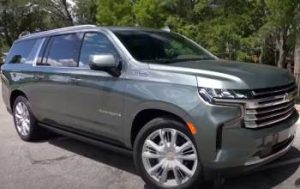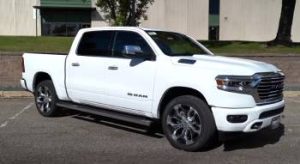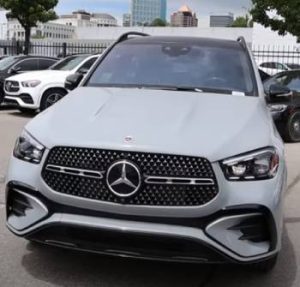So you’ve finally decided it’s time to get a new ride, and you’re stuck between the Honda CR-V and the Volkswagen Tiguan. Both of these compact SUVs have been taking the market by storm, offering a blend of reliability, comfort, and style.
But let’s break it down, shall we? What sets one apart from the other, and which one will be the perfect wingman for your life’s adventures?
A Brief Comparison Table
| Feature/Aspect | Honda CR-V | Volkswagen Tiguan |
| Engine | 1.5L Turbocharged 4-Cylinder (optional) | 2.0L Turbocharged 4-Cylinder |
| Fuel Efficiency | Excellent | Average |
| Interior Space | Ample Cargo Space | Optional 3rd-row seating |
| Safety Features | Honda Sensing Suite standard on most trims | VW Driver Assist available at extra cost |
| Infotainment | Slightly complex but feature-rich | More intuitive and user-friendly |
| Resale Value | Generally Higher | Generally Lower |
| Maintenance Costs | Lower | Higher |
| Drive Feel | Smooth and Stable, but less sporty | More robust and sporty |
| AWD Option | Available | Available |
The Honda CR-V: The Jack-of-all-Trades
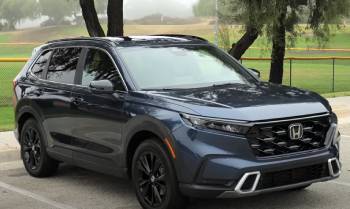
Ah, the Honda CR-V. This car is a crowd-pleaser, no doubt about it. One of the best-selling compact SUVs in America, the CR-V has built a strong reputation for being ultra-reliable, fuel-efficient, and incredibly practical.
Pros of the Honda CR-V:
Fuel Efficiency
The Honda CR-V shines when it comes to fuel efficiency. You’ll be zipping past gas stations and waving goodbye to the poor souls filling up their tanks more often than you.
Space Galore
CR-V offers ample cargo space. So, whether it’s a weekend getaway or a Costco run, you’ve got room to spare.
Safety Features
Honda’s Sensing Suite of safety features ensures you’re in good hands. We’re talking lane assist, adaptive cruise control, and collision mitigation—pretty much a guardian angel riding shotgun.
Cons of the Honda CR-V:
Less Than Stellar Base Engine
The base engine is a bit lackluster if you’re looking for more oomph in your drive. It’s not exactly a racehorse.
Infotainment Hiccups
Some users find the infotainment system a bit cumbersome. If you’re not tech-savvy, there might be a learning curve.
Also Read: Are RTX Wheels Worth It?
The Volkswagen Tiguan: The Euro-Chic Option
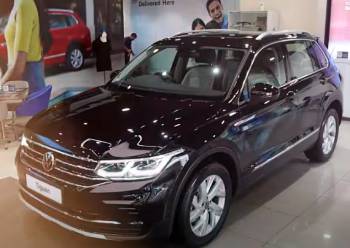
Now, let’s talk about the Volkswagen Tiguan. If you’re looking for a blend of European styling and engineering, this might be the SUV for you. It’s like a well-tailored suit—it just looks good, no matter the setting.
Pros of the Volkswagen Tiguan:
Extra Seating
One of the major advantages of the Tiguan is the optional third-row seating. It’s a lifesaver when you’ve got extra peeps to haul around.
High-Quality Interior
When it comes to the interior, Volkswagen doesn’t skimp. Premium materials and a classy design make for a cozy, high-end atmosphere.
Potent Engine
The Tiguan comes with a turbocharged engine that offers a more robust performance compared to the CR-V.
Cons of the Volkswagen Tiguan:
Less Fuel-Efficient
Unlike the CR-V, the Tiguan isn’t going to win any medals for fuel efficiency.
Pricey Features
Some of the best features are locked behind more expensive trim levels. Be prepared to dish out extra cash for those luxuries.
Your choice between the Honda CR-V and Volkswagen Tiguan will depend on what you prioritize. If reliability and fuel efficiency are your jam, go with the CR-V.
If you’re looking for a stylish, more robust drive and don’t mind spending a bit more, the Tiguan is your guy.
Key Differences Between the Honda CR-V and Volkswagen Tiguan: A Deep Dive
Alright, so you’ve got a general idea of what both the Honda CR-V and the Volkswagen Tiguan bring to the table. But let’s get into the nitty-gritty details. What are the key differences that might make you tilt towards one over the other?
Performance: Turbocharged vs Naturally Aspirated
The Volkswagen Tiguan’s turbocharged 2.0-liter four-cylinder engine offers better acceleration and a sportier drive. The Honda CR-V, in contrast, uses a naturally aspirated engine in its base model, which is less enthusiastic when it comes to acceleration.
The CR-V does offer a turbocharged option, but it still doesn’t quite match the punchiness of the Tiguan’s engine.
Fuel Efficiency: The CR-V Takes the Crown
Honda CR-V is the darling of the fuel-efficient crowd. With its continuously variable transmission (CVT), the CR-V gives you more bang for your buck at the pump.
In comparison, the Tiguan, even with its eight-speed automatic transmission, lags in fuel economy. This could be a crucial difference if you’re looking to save on long-term costs.
Interior Space: A Tale of Two Configurations
One of the standout features of the Tiguan is the optional third-row seating. If you’ve got a larger family or frequently find yourself as the designated driver for group outings, those extra seats could be a game-changer.
The CR-V, on the other hand, is strictly a two-row affair but compensates by offering generous cargo space. So, it boils down to what you need: more passenger space or more storage space?
Safety Features: Honda’s Sensing Suite vs VW’s Driver Assist
While both vehicles offer robust safety features, Honda’s Sensing Suite comes standard on most of its trim levels. It includes goodies like collision mitigation braking, road departure mitigation, and adaptive cruise control.
The Tiguan offers similar features but under different packages, and often at extra cost. If safety features are high on your priority list, you might find the CR-V a more straightforward option.
Infotainment: A Slight Learning Curve vs User-Friendly
The Honda CR-V’s infotainment system can be a bit of a mixed bag. It’s feature-rich but has been criticized for its user interface. The Tiguan’s infotainment system is generally more user-friendly, with a more intuitive interface and Apple CarPlay and Android Auto coming as standard features.
Resale Value: A Win for Honda?
Historically, Hondas have better resale values compared to Volkswagens. While the Tiguan is a fantastic vehicle, the CR-V might hold its value better in the long run. If you’re thinking of your new purchase as an investment, this could tilt the scales in favor of the CR-V.
Maintenance and Reliability: Trusted vs Trendy
Hondas are renowned for their long-term reliability and lower maintenance costs. Volkswagens offer solid reliability but generally cost more to maintain over the long run. This can add up over the years, making the CR-V a potentially more economical choice in the long term.
Also Read: Are Voxx Wheels Worth It?
Frequently Asked Questions (FAQs)
The Honda CR-V and Toyota RAV4 are generally similarly priced, but the CR-V tends to be slightly cheaper on base models.
Both the Honda CR-V and the Toyota RAV4 have excellent track records for reliability. However, Honda edges out slightly in terms of long-term maintenance costs.
Yes, the Honda CR-V offers a quieter ride compared to the Toyota RAV4, thanks to better insulation and less road noise.
Prices for a new Toyota RAV4 range from about $26,000 to $37,000, depending on the trim and optional features.
Both brands offer a range of reliable, fuel-efficient cars. Your preference may come down to specific features, ride quality, or brand loyalty.
The Honda CR-V consistently ranks among the most reliable compact SUVs, although other models like the Toyota RAV4 also fare exceptionally well in reliability studies.
Conclusion
Whew! That was quite the ride, wasn’t it? Hopefully, this detailed breakdown has given you enough food for thought. Both the Honda CR-V and the Volkswagen Tiguan are outstanding compact SUVs that offer a lot.
Your ultimate choice will depend on what specific features and aspects matter most to you. Choose wisely!

